
Robert Pattinson and Robert Pattinson in Mickey 17
MICKEY 17
If your last film won the Palme d'Or at Cannes, became a global sensation with $258.1 million against a budget of roughly $11 million, and won four major Oscars – one of them making your movie the first foreign-language release ever awarded Best Picture – what on earth do you do for an encore? If you're South Korean legend Bong Joon-ho, you go in the exact opposite direction, trading a contemporary, largely low-key setting for a futuristic, largely bombastic one, ramping up the budget to $118 million … yet delivering, in the process, laughs, thrills, and emotion to make the works, if not equals, unmistakable products of the same fertile imagination.
I get why it took Bong nearly six years to deliver a follow-up to Parasite, because really, what could hope to match Parasite? The auteur's punchy sci-fi comedy Mickey 17, though, is a wickedly entertaining kick that grapples with many of the same themes its filmmaker has long been obsessed with: capitalism; authoritarianism; class struggle; guilt. To sweeten the deal, it also gives us slapstick gallows humor, misunderstood monsters, the makings of a truly lunatic three-way, and more Robert Pattinsons than you ever dreamed of getting in a single 135-minute sitting. Bong's latest may not be Parasite, but the writer/director's adaptation of Edward Ashton's 2022 novel Mickey7 is still an almost overwhelming amount of fun.
The year is 2054, and our planet has finally become the unlivable shithole we've long been anticipating. Everyone, it seems, wants out (or rather off), and so it is for Pattinson's Mickey Barnes, a sweet, nasal-voiced, not-especially-bright young man who makes the mistake of trusting his friend Timo (an appropriately skeevy Steven Yeun) in a misguided business venture. (Timon believed that macaroons would soon be “bigger than burgers.”) These failed entrepreneurs wind up owing lots of money to the wrong people, and fearing for their lives, both sign up as members of a space crew headed to Niflheim – a purportedly uninhabited planet that preening dictator Kenneth Marshall (Mark Ruffalo) and his scheming wife Ylfa (Toni Collette) hope to make a new utopia. Timo gets to be a pilot. Mickey, not reading his application's fine print, is accepted as the team's resident “expendable.” This means that whenever a task is deemed too dangerous for an essential worker – when, for instance, the mission requires someone to test for radiation levels or breathable air – it's Mickey who's assigned to the job. Consequently, over the course of four-plus years, our hapless hero is usually rather promptly killed, after which he's replicated, and a new Mickey (with all of the previous Mickeys' memories) is birthed via the spacecraft's cloning device. As Mickey 17 begins, fittingly, we're on Mickey 17.
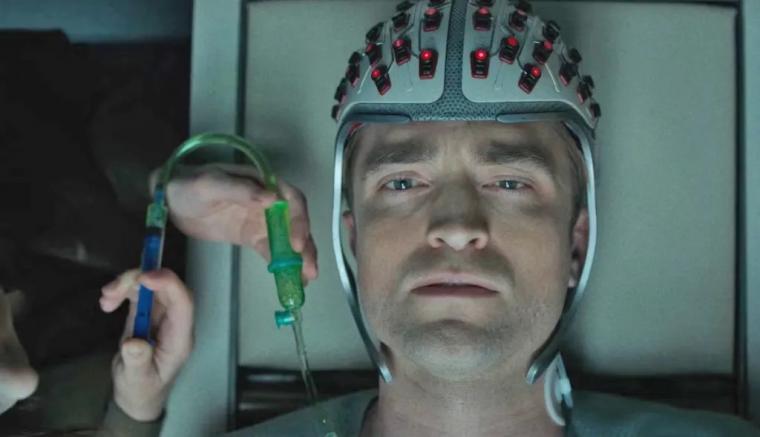
It's almost impossible to convey how elegantly Bong reveals all this information. Through a number of fleet, craftily edited montages accompanied by Mickey's amusingly doleful voice-over, we learn so much over a compressed amount of time: what the clones are composed of (banana peels and human waste!); what higher-ranking crew members think of expendables (there's fascination and even admiration attached to the general disdain); why cloning was declared illegal on Earth (epitomized by a flashback involving three identical serial killers). More importantly, we learn how Mickey feels about this whole situation, and the short answer is: not great. Dying, it turns out, sucks, and while Bong stages the expendables' demises for maximum dark humor, we're not necessarily asked to laugh at Mickey's suffering; the manners of death may be sick-joke funny, but the deaths themselves aren't. Fairly early on, it's made evident why our hero feels he deserves to be treated cruelly – to be killed – over and over again, and this knowledge adds an undercurrent of melancholy to even the silliest humiliations Mickey endures. When the cloning device spits out a new expendable and, because the system's attendant forgot to lay out a gurney, the clone's naked body plops on the floor, it's a hilarious sight gag. It's also a heartbreaking one.
Because the reams of exposition and backstory are so artfully expressed and enjoyable in their own right, you may not notice how long it takes for Mickey 17 to land on its central plot, even though it's teased in Bong's opening sequence. Following a perilous fall into an icy cave, our chief protagonist Mickey XVII is presumed a goner – by Timo, no less. Yet the expendable receives a miraculous second chance, only to find that, in the time it took him to return to the spacecraft, a Mickey 18 had been created in his absence. This guy is a dick, and wastes no time trying to eliminate his predecessor. (It's inferred that a wiring goof prevented Mickey 18 from being uploaded with salient Mickey Barnes traits including kindness, timidity, and empathy.) Soon enough, though, news of there being dual Mickeys is an open secret: to security officer Nasha (a wonderful Naomi Ackie), who has been dating and in love with the guy since Mickey One; to Nasha's fellow agent and apparent rival Kai (Anamaria Vartolomei); and, eventually, to those uncouth nightmares Marshall and Ylfa, who waste no time determining how to use this accident to their advantage.

This is probably the place to mention that I found Ruffalo and Collette hysterical in these roles, although your own tolerance for their intentionally broad portrayals will no doubt vary. Sporting hideously huge false teeth and jutting his chin and lips forward in a totalitarian pout, Ruffalo delivers a roaring caricature of despotic neediness – a comic turn as bravely brash as the one he provided for Poor Things – and it's easy to recognize both Mussolini and a specific American president in his look, bearing, and readings. (Marshall's most avowed acolytes wear red baseball caps.) Clearly, this two-time congressional failure is designed to be hooted at, and Ruffalo is, indeed, a hoot. But he's also legitimately threatening, and with the deliberately overripe Collette boasting claws on Ylfa's fingers and claws in her voice, these two are easily Bong's most rip-snorting comic nightmares since the Tilda Swinton of Snowpiercer. They're also perfectly employed for Bong's narrative; I was happy every time they were around, and didn't want a single second more of them.
Despite him being on-screen nearly constantly, however, oftentimes twice in the same frame, Mickey 17 could never give me quite as much Mickey as my soul demanded. Robert Pattinson is amazing here, and as has happened with plenty of obscenely handsome actors over the years, he likely won't receive anything close to the adulation (and awards) his work merits. Of course, Bong deserves loads of credit for making Mickey 17 phenomenally sympathetic and easy to root for, and he does a smashing job of delineating Mickey 18 so that the fiercer clone has a progressive arc not dissimilar to his forebear's. Yet in what is surely his most playful movie performance(s) to date, Pattinson is thunderously inventive in his line deliveries and physical choices – he leaps into slapstick scenarios like a silent clown from the 1920s – and, as #17, the actor practically makes comic melancholia visible; he's like a flesh-and-blood Charlie Brown with a rain cloud perpetually overhead. Bong's new offering wouldn't work, or wouldn't work half as well, without Pattinson making us truly care about this lovable doofus who's subjected to so much degradation and torture. He may as well be saying, “Go ahead and laugh. It's okay. I'd be laughing, too, if it didn't hurt so much.”
Beyond the futuristic gadgetry and sets, the employment of a big-name cast, and the presentation of the brilliant latest in state-of-the-art twinning effects, you may be wondering what the rest of Bong's $118 million budget went toward. My guess is that the dough was largely spent on the native beings who reside on the “unpopulated” Niflheim: undulating creatures, great and small, commonly referred to as “creepers.” In their slightly larval countenance, they look a bit like Dune's sandworms and a bit like toothy moles. For Mickey 17's purposes, though, they most resemble the gigantic pig-like hero of Bong's 2017 Okja, which, like this film, had an unmistakable anti-animal-cruelty bent. While the creepers are knockouts up close, they may be even more breathtaking in wide shots of them moving in herds – sights that are among many of the visual wonders here that feel like they're being witnessed nearly by accident. As in Okja and Bong's The Host from 2006, the subtly masterful effects don't call undue attention to themselves, and that's a necessary component for a work suggesting, with a pang, how frighteningly connected the fantasy of 30-years-from-now is to the reality of today.
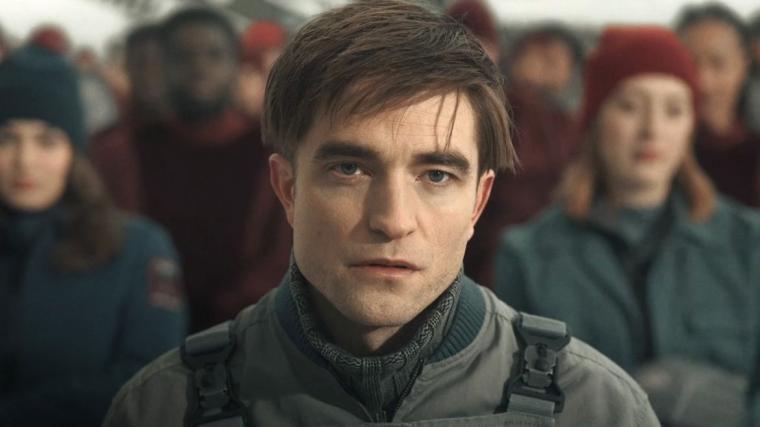
Unlike with Parasite, which is as close to flawless cinema as I've seen over the past 10 years, I did register a few flaws. Despite Bong's tightly controlled plotting, not all of it makes logical sense even in the realm of fantasy: Why would this intergalactic mission only have one expendable on-board when including dozens would theoretically make the fact-finding jobs go faster? In a surprise coming from Bong, the lighting (with the usually expert Darius Khondji as cinematographer) is unremarkable and even rather ugly both aboard the spacecraft and on the icy Niflheim, and some of the director's compositional choices are confusing. (A scene of Mickey preparing to jump numerous yards downward looks instead like he's gonna jump about two feet.) And Vartolomei's Kai is a weirdly unrealized figure, entering the fray like she'll be of principal importance and interest yet quickly getting lost in the shuffle.
Still, my quibbles notwithstanding, I very much love Mickey 17, and couldn't have loved the experience of my screening more if I tried. Attending the film with a dear friend and fellow movie hound in Chicago, we caught Bong's latest in its engagement at the Music Box, that glorious palace of old that can always be counted on for (terrific) pre-show live organ music, and can generally be counted on for the delight of watching a public screening with others who, like you, are super-stoked to be there. Our fellow patrons in the sizable Saturday-afternoon crowd roared at the funny and gasped, understandably, at the painful, and when Bong Joon-ho's name appeared in the end credits, it was greeted with hearty applause. For two-plus hours, I wanted to stay in that space forever. There's nothing like having the ideal surroundings, and ideal cohorts, to complement a significant Bong hit.
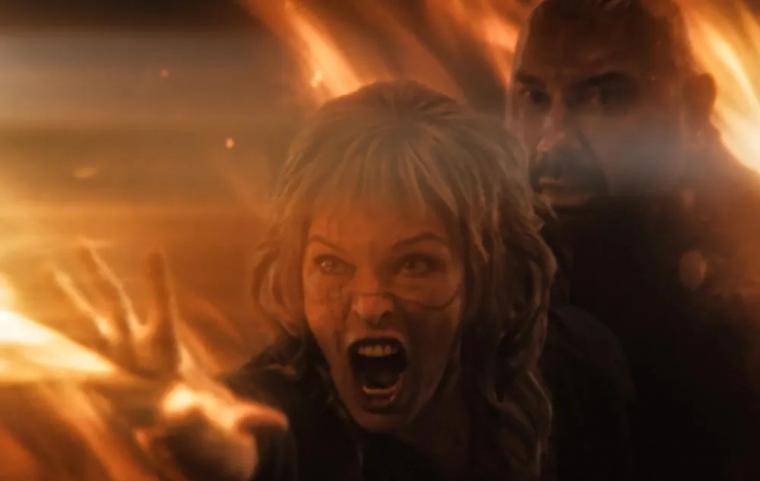
IN THE LOST LANDS
Adapted from a short story by Game of Thrones visionary George R.R. Martin, In the Lost Lands is about an evil queen who sends a witch and a cowboy on a magical quest to retrieve the power of a werewolf. I swear I wasn't high when I typed that sentence. But I'm making no claims about whatever states of mind director Paul W.S. Anderson and screenwriter Constantin Werner – and, for that matter, Martin himself – were in when they devised this doozy of a genre-hopping adventure, which is the sort of thing that would be a blast to tear apart if it weren't, against all logic, totally watchable. Of course, that's hardly the same thing as being good, and in many ways, this latest excuse for Anderson and his bride/muse Milla Jovovich to hang out and get paid for it is really, really not good. It does, however, have some of the energy that lifted parts of Anderson's Pompeii, Monster Hunter, and less egregious Resident Evil flicks. In other words, it's crap, but relatively tasty as crap goes.
Anderson's latest also has Dave Bautista, and although he and Jovovich will likely never be accused of having much range, their combined lack of it is unexpectedly advantageous here. He's playing every taciturn, grim-faced, mildly sardonic movie cowboy you've ever seen, and she's playing, or “playing,” a deadpan Cassandra whose knowledge clearly hurts her more than it'll ever hurt you, and it's a surprisingly potent combo: one archetype in an unlikely alliance with another. Helping matters is that Werner's script, with its pin-the-tail-on-the-donkey approach to narrative strategy, contains a fair share of jokes, or at least mood-lighteners. I almost died of shock when Bautista's Boyce and Jovovich's Gray Alys took a break from battling adversaries and plummeting off cliffs and grimacing and simply laughed together.
Aside from recounting the general storyline, having seen In the Lost Lands three whole days ago, I couldn't begin to recall the niceties of the easy-to-follow yet resolutely ridiculous plot. My memories are basically a melange of unsaturated lighting and shoddy CGI effects compounded by the recurring image of an on-screen map of (as in Game of Thrones) places I couldn't name with a gun to my head. But I do remember Spanish performer Arly Jover being a fantastically hissable villain, and appreciated Amara Okereke's daytime-drama histrionics as the scheming queen, and was actually quite engaged with the witch's film-spanning dilemma. Gray Alys, it turns out, can never deny the request for a granted wish, and near the film's start, she agrees to both the queen's demand for werewolf blood and her underling's demand to have the queen's request fail. How on earth, I thought, is poor, emotionless Milla Jovovioch gonna pull that off?! For the two of you who care, I won't spoil the answer. But it was a nice reminder that even the blandest of mixed drinks can be improved with just the right twist.
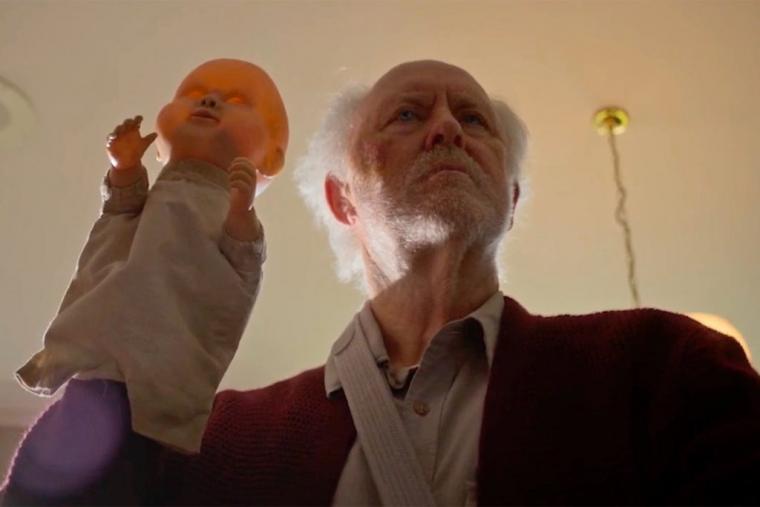
THE RULE OF JENNY PEN
National treasure John Lithgow will turn 80 this October. So the time feels right for a question: Has any male actor, ever, demonstrated such remarkable range over a five-decades-plus career in film, television, and theatre?
We may take him for granted these days, but Lithgow is endlessly stunning. He can certainly go big, as evidenced by 3rd Rock from the Sun and Twilight Zone: The Movie and Bombshell. Despite his six-foot-four stature, he can go (relatively) small, as in Conclave and Love Is Strange and TV's The Day After. He was a convincing transgender football player in The World According to Garp (one of his two Oscar nominations). He was a convincing Winston Churchill in The Crown (one of, to date, his six Emmy victories for acting). He won a featured-actor Tony for a stage drama. He won a leading-actor Tony for a stage musical. He broke hearts in Terms of Endearment and Harry & the Hendersons. He ignited indignation in Miss Sloane and Footloose. He was Shrek's original Lord Maximus Farquaad, for Pete's sake. And as we Lithgow die-hards know and love, he can be scary as eff, whether he's traumatizing John Travolta in Blow Out or enraging Michael C. Hall in Dexter … or, now, making already-insufferable nursing-home life hell for Geoffrey Rush in The Rule of Jenny Pen.
If you haven't heard of director/co-writer James Ashcroft's New Zealand creep-out, you've got a lot of company. In its national debut this past weekend, the film couldn't score a per-screen average of $300 across 878 theaters, and despite 34 available Quad Cities auditoriums between Moline's VIP Cinemas and Davenport's Rave 53 and Last Picture House, The Rule of Jenny Pen didn't play on any of them. (I saw Ashcroft's movie in Chicagoland, and it's still being shown – for at least a few more minutes – at Iowa City's Marcus Sycamore Cinema). Yet as much as I'd love to tell you to seek it out wherever and however you can, I can't. This psychological thriller is less thrillingly scary than truly, deeply unpleasant, with the added pitfall of making those audiences who might conceivably turn out for a Lithgow/Rush release in 2025 wish they hadn't. But I'm still glad I saw the thing, because Rush is excellent in a big, juicy role, and Lithgow, as he frequently demonstrates, knows how to unsettle the bejeezus out of us.
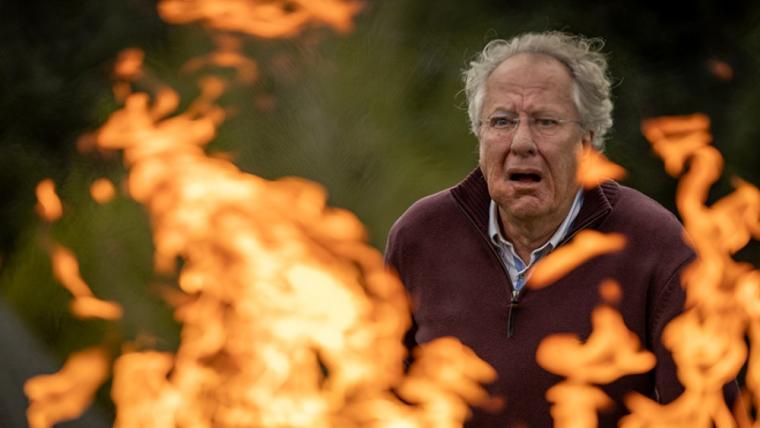
After suffering an immobilizing mid-trial stroke, Rush's Judge Stefan Mortensen, having no family, is sent to recuperate at a nursing facility that he quickly learns is under the thumb of Lithgow's resident Dave Crealy, a hulking brute with indescribable teeth who routinely speaks under the guise of his titular baby-doll hand puppet. With its empty eye sockets, this demented plaything is almost as horrifying as Crealy himself, who's prone to stealing his co-residents' food, absconding with their personal effects, and, when he's feeling especially naughty, yanking on their catheters. Crealy's behavior going apparently unnoticed by the staff, Mortensen vows to put an end to the madness – and soon wishes he hadn't. Although the trailer and the movie's distribution company Shudder suggest that perhaps Jenny Lin is a demonically possessed doll, or that Clearly is being possessed by it, that isn't the case. Lithgow's bastard is just a mean, angry, diseased septuagenarian, and Johnson and co-screenwriter Eli Kent, adapting Owen Marshall's short story, go out of their way to suggest that a doll acting on Satan's behalf might, under these circumstances, have actually been preferable.
To give you an idea of how upsetting Ashcroft's outing is from the start, the first fatality we witness finds a resident burned alive in his wheelchair when the cigarette he's been smoking falls into his liquor-soaked lap – and Dave Crealy is in no way responsible! What he is responsible for is leading a dementia patient to her own death, and closing the door on a soon-to-be-deceased patient who's pathetically crawling on the floor, and the seemingly planned rape of yet another wheelchair-bound senior … . I can't begin to describe how much I hated watching this movie. Even when the on-screen atrocities are mere examples of rudeness to the nth degree, as when Crealy purposely steps on his fellow residents' toes during an afternoon dance, Ashcroft appears to luxuriate in the discomfort and ugliness, making nursing-home life look like a fate literally worse than death. (I saw the film with my parents, both of whom are in their 80s, and I'm frankly amazed that my mother, afterward, didn't make me sign an affidavit swearing to never consign her to one of those facilities.) It's a choice, I guess, to make the otherwise friendly-seeming employees incognizant of Cleary's obvious psychopathy. But it's also a reductive and unsatisfying choice. Are the staffers' collectively blind eyes to Cleary's threat, and the total lack of police involvement, a commentary on the elder-care system as it currently stands, at least in New Zealand? Or is this just lazy, lousy screenwriting?
Either way, at least Rush is again allowed to be characteristically magnificent, rendering both Mortensen's physical malady and escalating emotional ire with consummate specificity, and I appreciated that Ashcroft's and Kent's script didn't try, in any way, to make the guy likable. (That initial courtroom scene, and several of Mortensen's exchanges afterward, suggest that he's maybe deserving of a creep such as Dave Crealy.) And while his regional dialect is dicey at best, Lithgow, going big-bigger-biggest, is pointedly unnerving in his going-for-broke portrayal – a legitimately spectacular performance in a gross little throwaway that doesn't deserve one. With its instantly forgettable title already suggesting an experience that won't linger, The Rule of Jenny Pen won't be long for cineplexes, or probably for streaming interest, either. But every once in a while, for years to come, one of its viewers will no doubt land on it in an assemblage of Lithgow's credits, and we'll be forced to think, “Oh, right … that one.” Insert reflexive shudder.








